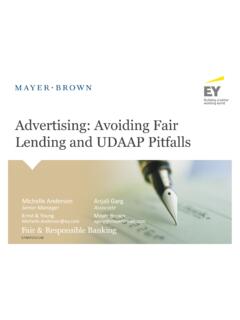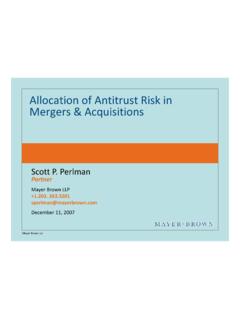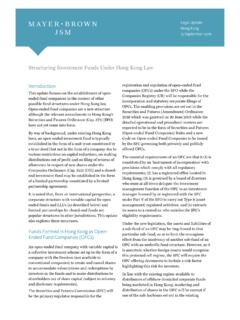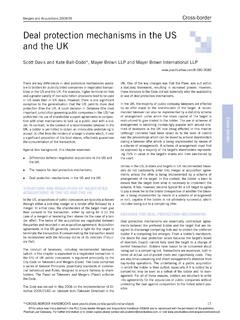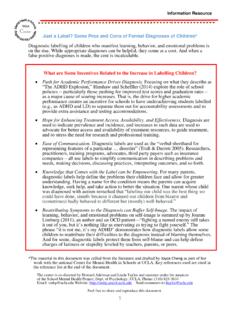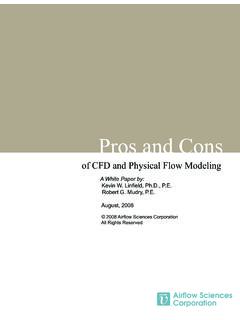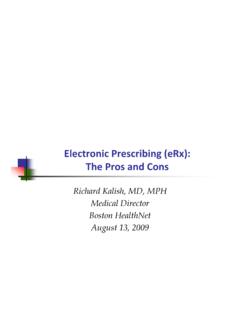Transcription of The pros and cons of arbitration - Mayer Brown
1 Produced in Partnership with Mayer Brown International LLPThe pros and cons of arbitrationA Lexis PSL document produced in partnership with Mayer Brown International LLPO verviewIt is often said that arbitration is a more effective and efficient method for resolving a dispute than litigation but is this actually the case? This note considers the pros and cons of selecting arbitration as an alternative means of dispute resolution to litigation. In particular, it seeks to dispel the myths surrounding arbitration and examines the real benefits it provides in is important to note that selecting arbitration as the forum for dispute resolution does not affect the existing statutory right in the UK to refer construction disputes to adjudication.
2 If a contract contains an arbitration agreement and a dispute is referred to adjudication, then the right to seek to overturn the adjudicator s award remains but this will be by way of arbitration rather than and costIt is often said that arbitration is quicker and cheaper than litigation. However, arbitrations may in certain cases actually be more protracted and more expensive than litigation. There are numerous reasons for this, including: - the additional costs payable in arbitration which are not applicable in court proceedings. For example, the requirement to pay the arbitrators fees, any institutional administrative fees and to pay to hire the hearing venue - poorly drafted contracts with arbitration agreements which fail to provide an adequate and practical framework for the conduct of the arbitration proceedings - tribunals being unwilling to control the timetable and the parties conduct for fear of challenges to the subsequent award on the grounds of unfairnessDisputed enforcement proceedings (although this is an area which various arbitral institutions are working hard to address, for example with the new ICC Rules).
3 Multi-party disputesArbitration may not be suitable where there are several parties to a dispute. This is common in construction claims where a single dispute may involve an employer, a contractor, subcontractors, suppliers and consultants. If some of the contracts stipulate arbitration but some do not, problems often arise when trying to force parties into parallel disputes in different forums with potentially different results. Further, even if all the contracts contain an arbitration agreement, it is not possible to join other parties to an arbitration unless this is expressly provided for. Litigation does not suffer from this is possible to have multi-party disputes in arbitration with careful drafting of the arbitration agreement and the incorporation of certain institutional rules.
4 Produced in Partnership with Mayer Brown International LLPN eutralityIn international contracts, parties are often reluctant to submit to the jurisdiction of foreign courts for fear of bias. Whether or not this fear is justified (which will depend upon the jurisdiction in question), the neutrality offered by arbitration is a particularly attractive alternative. Therefore, for contractors and consultants undertaking construction projects abroad, arbitration remains the best way to ensure a fair hearing in a neutral rarely welcome the publicity that comes with court proceedings. This is particularly the case on sensitive or high profile projects or where serious allegations of poor performance are being advantage of arbitration is that it is a private process and can be a confidential one.
5 When drafting arbitration agreements, it is good practice to include an express provision for confidentiality to ensure that this is the this, a party wishing to enforce an award would have to go through the public court system, where confidentiality could be autonomy and flexibilityOne positive aspect of arbitration is that it gives parties a significant degree of autonomy and flexibility in resolving their disputes which they would not otherwise have through litigation. This will be seen by many as a significant advantage as it allows the parties to tailor the agreed method of dispute resolution to their individual commercial and practical is open to the parties to adopt an arbitration process which allows them to select the arbitrator(s) who will determine their dispute.
6 This provides comfort because it maximises the chances of ensuring that the tribunal is suitably experienced and trusted to arrive at a sound decision. This is particularly the case in international contracts in jurisdictions without specialist courts for construction ability to nominate an arbitrator can also be used for tactical gain. Parties may try to appoint an arbitrator who they believe will be sympathetic to their case. For example, if a party has a good contractual argument, it may be preferable to nominate an arbitrator with a legal background and who has a reputation for preferring a strict interpretation of contractual terms. Equally, if a party has a strong technical case but has difficult legal arguments, a technical expert may be a more suitable also offers parties the ability to choose the language in which the proceedings will be conducted, which is often vital in international arbitration .
7 It is not advisable for a party to find itself in a position where it is forced to refer a dispute to a foreign court where the entirety of the proceedings is conducted in the language of that choice of language in an arbitration can be tailored to suit the common language of the parties and will assist the ability of witnesses to provide evidence to give weight to a party s case without the need for an rulesParties can agree to conduct arbitration proceedings under the auspices of a recognised arbitral institution (eg ICC, LCIA, AAA) or to conduct the arbitration ad hoc. However, it is always advisable to ensure that parties expressly specify in the arbitration agreement a suitable set of institutional rules as they: - provide a framework for the management and administration of the arbitration proceedings - minimise court intervention (eg constitution of the tribunal or where an arbitrator is challenged on impartiality)Conversely, ad hoc arbitrations can be significantly protracted and more expensive as there is greater exposure to disruption and delay.
8 Refer to the practice note Institutional versus ad hoc arbitration on the various institutional rules for more in Partnership with Mayer Brown International LLPE videnceThe rules of disclosure for arbitration proceedings can make it an attractive alternative to litigation. Standard disclosure in litigation conducted in the courts of England and Wales requires a party to disclose all documents which are relevant to its case whether they are helpful, prejudicial or support another party s case. They also require a party to set out details of the searches it has made for relevant documents. This makes disclosure an onerous process, particularly given the propensity for emails and the ability to search and retrieve electronic documents.
9 It may also force a party to show cards which it may not wish to play. (References: CPR ) arbitration provides more flexibility. Many arbitration rules only require a party initially to disclose documents upon which it relies (ie only those helpful to its case). It is then for the other party to review those documents and make specific and focused requests for other documents or categories of documents. This also assists in controlling the costs of to the practice note Disclosure in arbitration which discusses the approach taken to disclosure in arbitration in more detail. The awardFinal and bindingArbitration awards are, by their nature final and binding and dependant on the jurisdiction which the arbitration is subject to, there is normally a very limited right of appeal.
10 This is both an advantage and a disadvantage depending upon the circumstances. The finality of an award prevents further delay and the costs of an appeal procedure. However, this may not be good if the tribunal have made serious errors by misinterpreting the does not suffer from this restriction but appeals can only be made in limited of the awardFollowing the conclusion of the 1958 New York Convention on the Recognition and Enforcement of Foreign Arbitral Awards (the Convention ), one of the key advantages of arbitral awards are that they are much more easily and consistently enforceable in foreign courts than judgments from foreign courts. (References: 1958 New York Convention on the Recognition and Enforcement of Foreign Arbitral Awards)The Convention provides significant comfort to parties seeking to enforce an award in a foreign country which is a signatory to the Convention.

